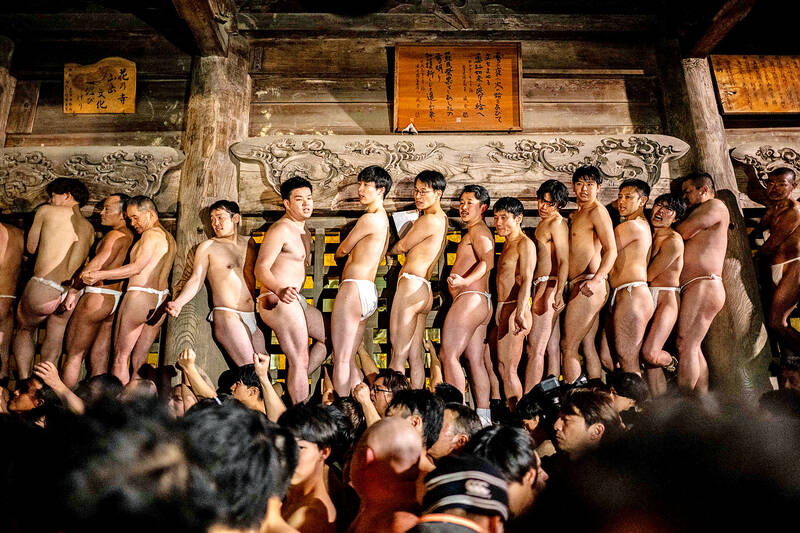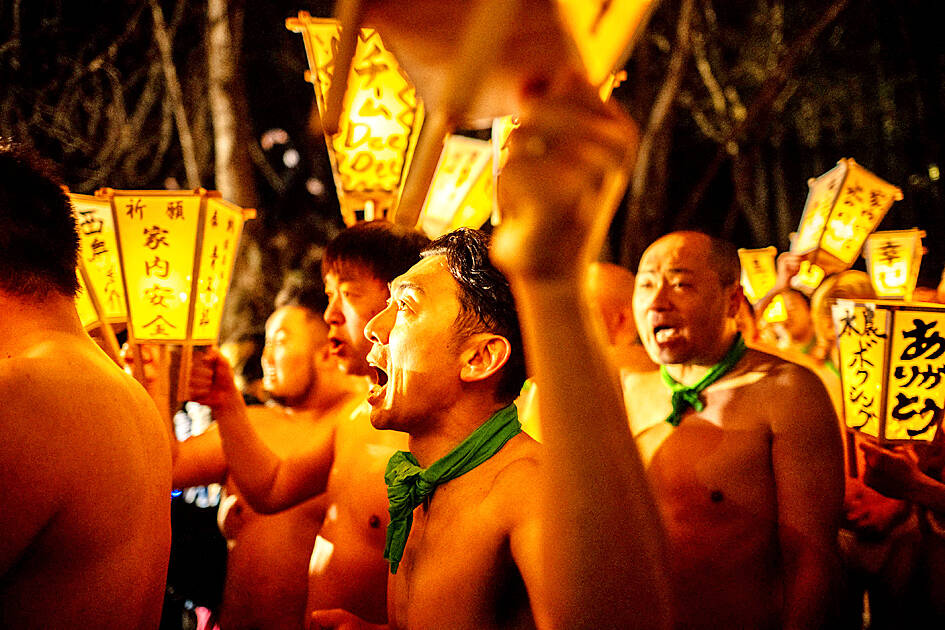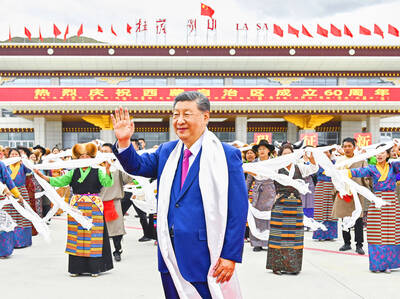A steam of sweat rose as hundreds of naked men tussled over a bag of wooden talismans, performing a dramatic end to a thousand-year-old ritual in Japan that took place for the last time.
Their passionate chants of “jasso, joyasa” (“evil, be gone”) echoed through a ceder forest in Japan’s Iwate Prefecture, where the secluded Kokuseki Temple is ending the popular annual rite.
Organizing the event, which draws hundreds of participants and thousands of tourists every year, has become a heavy burden for the aging local faithful, who find it hard to keep up with the rigors of the ritual.

Photo: AFP
The Sominsai festival, regarded as one of the strangest festivals in Japan, is the latest tradition affected by the country’s aging population crisis that has hit rural communities hard.
“It is very difficult to organize a festival of this scale,” said Daigo Fujinami, a resident monk of the temple, which opened in 729.
“You can see what happened today — so many people are here and it’s all exciting, but behind the scenes, there are many rituals and so much work that have to be done,” he said. “I cannot be blind to the difficult reality.”

Photo: AFP
Japan’s society has aged more rapidly than most other countries’. The trend has forced countless schools, shops and services to close, particularly in small or rural communities.
Kokuseki Temple’s Sominsai festival used to take place from the seventh day of Lunar New Year through to the following morning, but during the COVID-19 pandemic, it was scaled down to prayer ceremonies and smaller rituals.
The final festival was a shortened version, ending at about 1pm, but it drew the biggest crowd in recent memory, local residents said.
As the sun set, men in white loincloths came to the mountainous temple, bathed in a creek and marched around temple’s ground. They clenched their fists against the chill of a winter breeze, all the while chanting “jasso joyasa.”
Some held small cameras to record their experience, while dozens of television crews followed them through the temple’s stone steps and dirt pathways.
As the festival reached its climax, hundreds of men packed inside the wooden temple shouting, chanting and aggressively jostling over a bag of talismans.
Toshiaki Kikuchi, a local resident who claimed the talismans and who has helped organize the festival for years, said he hoped the ritual would return one day.
“Even under a different format, I hope to maintain this tradition,” he said. “There are many things that you can appreciate only if you take part.”
Many participants and visitors voiced sadness and understanding about the festival’s ending.
“This is the last of this great festival that has lasted 1,000 years. I really wanted to participate in this festival,” said Yasuo Nishimura, 49, a caregiver from Osaka.
Other temples across Japan continue to host similar festivals where men wear loincloths and bathe in freezing water or fight over talismans.
Some festivals are adjusting their rules in line with changing demographics and social norms so that they can continue to exist — such as letting women take part in previously male-only ceremonies.
From next year, Kokuseki Temple plans to replace the festival with prayer ceremonies and other ways to continue its spiritual practices.
“Japan is facing a falling birthrate, aging population and lack of young people to continue various things,” Nishimura said. “Perhaps it is difficult to continue the same way as in the past.”

Ten cheetah cubs held in captivity since birth and destined for international wildlife trade markets have been rescued in Somaliland, a breakaway region of Somalia. They were all in stable condition despite all of them having been undernourished and limping due to being tied in captivity for months, said Laurie Marker, founder of the Cheetah Conservation Fund, which is caring for the cubs. One eight-month-old cub was unable to walk after been tied up for six months, while a five-month-old was “very malnourished [a bag of bones], with sores all over her body and full of botfly maggots which are under the

BRUSHED OFF: An ambassador to Australia previously said that Beijing does not see a reason to apologize for its naval exercises and military maneuvers in international areas China set off alarm bells in New Zealand when it dispatched powerful warships on unprecedented missions in the South Pacific without explanation, military documents showed. Beijing has spent years expanding its reach in the southern Pacific Ocean, courting island nations with new hospitals, freshly paved roads and generous offers of climate aid. However, these diplomatic efforts have increasingly been accompanied by more overt displays of military power. Three Chinese warships sailed the Tasman Sea between Australia and New Zealand in February, the first time such a task group had been sighted in those waters. “We have never seen vessels with this capability

A Japanese city would urge all smartphone users to limit screen time to two hours a day outside work or school under a proposed ordinance that includes no penalties. The limit — which would be recommended for all residents in Toyoake City — would not be binding and there would be no penalties incurred for higher usage, the draft ordinance showed. The proposal aims “to prevent excessive use of devices causing physical and mental health issues... including sleep problems,” Mayor Masafumi Koki said yesterday. The draft urges elementary-school students to avoid smartphones after 9pm, and junior-high students and older are advised not

Chinese President Xi Jinping (習近平) attended a grand ceremony in Lhasa yesterday during a rare visit to Tibet, where he urged “ethnic unity and religious harmony” in a region where China is accused of human rights abuses. The vast high-altitude area on the country’s western edge, established as an autonomous region in 1965 — six years after the 14th Dalai Lama fled into exile — was once a hotbed for protest against Chinese Communist Party rule. Rights groups accuse Beijing’s leaders of suppressing Tibetan culture and imposing massive surveillance, although authorities claim their policies have fostered stability and rapid economic development in